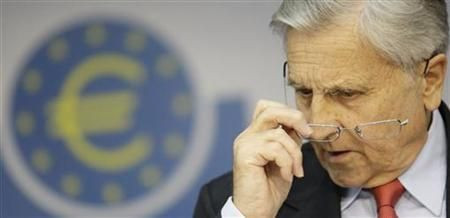ECB extends liquidity program into 2011; interest rates unchanged

The European Central Bank (ECB) left the benchmark rates unchanged for the 19th straight month, and said it would extend its longer-term liquidity tenders into the first quarter of 2011.
The extension of the liquidity measures come as a relief to Europe’s debt-laden markets, most of which expected the program to be phased out early next year.
The bank would maintain full allotment options for the first quarter of 2011 and would be adjusted beyond that as deemed “appropriate,” ECB President Jean-Claude Trichet in a press conference.
However, Trichet refused to comment on the pressure for the Securities Market Program (SMP) to be increased and said that it is “ongoing.”
“I won’t comment on the observations of market participants,” he said.
The ECB, which began purchasing bonds through the SMP in May, has spent about 67 billion euros so far on the program.
Markets were expecting the bank to increase its level of support, as the debt crisis in Europe deepens with Italy, Spain and Portugal expected to require financial assistance in the future.
The halt on the phasing out of the program was inevitable, given the high dependence on ECB funding by banks in the more vulnerable Euro zone countries,” Howard Archer, an economist at IHS Global Insight, said in a note.
However, given that the extension was the minimum was what was expected or hoped for by the markets, it is unlikely to ease tensions, he added.
Earlier in the day, the ECB announced that interest rates would be left unchanged at the record low of 1 percent, as expected.
“It was inconceivable that the ECB would do anything else but keep interest rates down at 1.0%. Not only do economic conditions in the Euro zone still warrant record low interest rates, but to have hiked rates at a time of such turmoil could only have made matters worse for Greece, Ireland, Portugal and Spain,” Archer said.
The Euro zone is threatened by high unemployment, recurrent sovereign risk problems and slower global economic activity in the coming months, he added.
Archer expects underlying inflationary pressures remain muted and are likely to remain so “given significant output gaps and spare capacity, as well as muted wage growth amid high unemployment.”
The ECB expects inflation to hover around 1.9 percent for the euro area over the next few months. “Inflation expectations over the medium to longer term continue to be firmly anchored in line with the governing council’s aim of keeping inflation rates below, but close to 2 percent over the medium term,” Trichet said in the conference.
The low inflation rate gives the bank more room to hold the interest rates low.
The ECB expects HICB inflation to remain around the 1.5 percent to 1.7 percent rate in 2010, between 1.3 percent and 2.3 percent in 2011 and 0.7 percent and 2.3 percent in 2012.
Trichet forecast economic growth of the euro area to be between 1.6 percent and 1.8 percent for 2010, and between 0.7 percent to 2.1 percent in 2011.
© Copyright IBTimes 2024. All rights reserved.



















